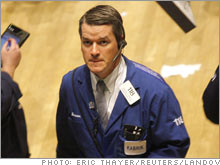NEW YORK (CNNMoney.com) -- The Dow Jones industrial average closed at a record high Thursday for the second day in a row. That's nice for the headlines, but what does it actually mean for the market going forward?
Probably not very much.
 |
| A trader at the New York Stock Exchange Wednesday, when the Dow industrials closed at an all-time high. |
After all, earnings are still expected to grow just 4 percent or so in the first quarter, the slowest pace in more than 3-1/2 years. The Federal Reserve is on hold, maybe for the rest of the year. And economic growth is sluggish, though most money managers and economists think a recession can be avoided. Lastly, inflationary pressures seem to be ebbing but it's far from clear they won't pick up again.
All this uncertainty about investing in the United States has helped drive the dollar to a 2-year low versus the euro and its lowest in 26 years versus the pound.
In short, the market looks an awful lot like it did before the big Dow record was broken.
"The Dow record is just a headline thing, it's psychological, but not something more," said Joseph Saluzzi, co-head of equity trading at Themis Trading. "Professionals don't pay attention to it. The Dow is just 30 stocks."
The broader S&P 500 index - more closely tracked by market professionals - closed at a 6-1/2 year high Wednesday, but remains about 3.7 percent below its record closing high of 1,527.46, hit in March of 2000.
The Nasdaq, meanwhile, is nowhere near its record close of 5,048.62, also hit in March 2000.
"The Dow has always been a quirky average," said Donald Selkin, director of research at Joseph Stevens. "It's only 30 stocks and its price weighted, so when a high-priced stock goes up, it has a big impact on the overall average."
Selkin said that's partly what happened Wednesday, when Boeing, a pricey stock, surged 4 percent, helping to boost the overall average.
Still, the Dow's record is far from meaningless. It's relevant in that people who are not market pros probably see it as synonymous with the stock market, and so in that sense it improves sentiment, Selkin said.
It also boosts the chances of another "correction" - which some analysts say is probably in the cards for 2007, possibly in the fall - before stocks can move higher again.
"If the Dow continues to make new highs, there's a greater risk of another big decline," said Peter Cardillo, chief market economist at Avalon Partners.
Thursday's gain for the Dow was small - not even 5 points. And the record's relevance to stocks in light of broader issues is certainly debatable.
But what's more interesting is that the Dow's new record marked a return to the levels stocks were at in late February before the big selloff.
Prior to Wednesday's record, the Dow's previous all-time high - of 12,786.64 - was hit on Feb. 20, after eight months of gains as part of the longer 4-1/2-year-old bull market. But the celebration proved short-lived.
Just a week later, on Feb. 27, a global selloff sent the Dow plunging 416 points, its biggest one-day point loss since the day the market reopened after the Sept. 11 attacks.
The selloff was sparked by a steep drop in Chinese stocks in Shanghai, which quickly spread to other markets around the world. The next two weeks brought increased volatility and increased worries, as the focus turned to questions about economic growth, and especially how the then-emerging meltdown in the subprime mortgage market would impact the broader economy.
Yet, as worries about the so-called "contagion effect" of subprime eased, the market began to recover, making a slow and steady return to pre-selloff levels, all of which culminated in Wednesday's record-breaking session.
The Dow is made up of big blue chip companies, including big financial stocks. So the index's recovery suggests that a lot of these big institutions were not hit badly by subprime, which is important for the economy, Selkin said.
So from a big picture perspective, the Dow's record could be seen to suggest that market fundamentals haven't changed much since the Feb. selloff - with the exception of increased day-to-day volatility. 